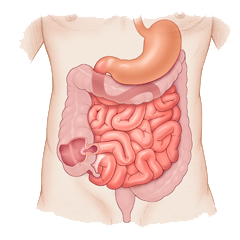What is Colonoscopy or lower gastrointestinal (GI) endoscopy?
Colonoscopy is a procedure in which, an endoscope a flexible long tube with attached camera at end, is passed through anus till distal most part of small intestine through entire colon by a specialist gastroenterologist to see the inner lining.
What is Lower GI Tract?Lower GI tract usually include entire colon and colonoscopy can see upto distal most part of small intestine.

This procedure should be done at a licensed facility by trained endoscopist, usually a gastroenterologist in assistance with trained endoscopy staff.
When do doctor advice for Colonoscopy?
Doctor advise colonoscopy to diagnosed and treat symptomps pertaining to lower GI tract.
Find the cause of symptoms, such as:
Colonoscopy may also be advised as screening tool to diagnosed polyp or early colonic cancer which has high probability for getting cure.
Colonoscopy may also be advised as therapeutic procedure for:
First talk with your doctor/endoscopist
Consent
Your doctor will explain about the procedure and its risks & benefits and after that as with all medical procedures, you will be asked to sign a consent form that certifies that you understand that.
Normally, diagnostic colonoscopy is very safe. There are very few complications that can occur like perforation and bleeding, but not limited to it. However, perforations usually occur when the area being examined is diseased and stricturous. Also, bleeding can occur with certain procedures and in certain group especially taking blood thinners, which is why those drugs should be stopped before the procedure. There can be Anesthesia related complication including a reaction to the sedative, breathing or heart problems and Death, although this risk is rare.
Change your diet and clean out your bowel
For colonoscopy, proper bowel preparation is essential. Endoscopist need clear bowel to see inner lining of colon clearly. Detaled written instruction would be provided by health care professional for preparation. It should be followed at home and before procedure so that person undergoing procedure passes clear liquid stool and no stool remained inside to interfere with vision.
Dietary instruction:
It is imperative to be on liquid diet for 1 to 3 days before procedure which would be easier to clear. Person may take following dietary items:
Red and purple-colored drinks or gelatin should be avoided during this period
Bowel preparation: Bowel preparation is needed along with dietary changes for further cleansing, There are many bowel preparation is available and your healthcare professional prescribe it depending upon your clinical history. Usually it is prescribed in morning on the day of procedure or in some cases split dose preparation is needed that is half dose on previous evening and half on the morning of procedure. In some cases, enema through anal route is needed.
Bowel preparation will cause diarrhoea, so personal should stay close to bathroom. It is most cumbersome part of the procedure and person may experience few problems during preparation. If person feels nauseated or vomits out while taking the bowel preparation, he or she should wait for half an hour before drinking more fluid and again to start with small sips of solution. If complain persist, he or she might have to stop preparation and to consult physician. Person may experience skin irritation around the anus due to frequent passage of liquid stools. To prevent this, he or she can apply vaseline to the skin around the anus before drinking the bowel preparation medications and should wipe the skin after each bowel movement with disposable wet wipes instead of toilet paper.
During a colonoscopy, a gastroenterologist uses a colonoscope, which is around five to six feet long, flexible tube with 1/2 inch of diameter to view the inner lining of the colon. Anesthetist may insert intravenous needle in your hand if planned for anesthesia so that person may not feel pain during the procedure. Person is lied down on left side of body; however during procedure it may require to change posture on frequent basis. The colonoscope is inserted through anus into the rectum and slowly advanced through the large intestine till last part of small intestine distal ileum. After that, colonoscope is slowly removed to see the inner lining. It usually takes half and one hour to complete the procedure. It is common to feel cramps during procedure which can be reduced with slow deep breath.
If necessary during a colonoscopy, small amounts of tissue can be removed for analysis (a biopsy) and polyps can be identified and entirely removed. In many cases, a colonoscopy allows accurate diagnosis and treatment of colorectal problems without the need for a major operation.
What to Expect After Colonoscopy?
After a colonoscopy, you can expect the following:
Seek Care Right Away It.
Person might have to seek immediate care if any of the the following symptoms are experienced:
